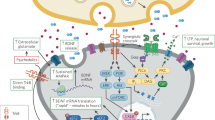Summary.
The maldevelopmental model of schizophrenia postulates pathological alterations in embryonal neurogenesis as the etiopathogenetic basis of schizophrenic psychosis; the neurotrophic factor hypothesis explains these changes as the result of disturbances of processes involving the trophic factors. Neurotransmitter deficits are thereby interpreted as epiphenomena of underlying neurotrophic factor deficacy. The functional systems of the various neurotrophic factors are characterized by complex interaction mechanisms. Both primary genetic alterations, and secondary impairments, induced by exogene noxae, of the receptors and signal transducers associated with neurotrophic factors, as well as of the neurotrophic factors themselves are possible. Preliminary clinical studies indicate that schizophrenic psychoses may be associated with changes in the genetic code of certain neurotrophic factors. Various phenomena typical of the schizophrenic psychoses can be interpreted according to the neurotrophic factor hypothesis.
Similar content being viewed by others
Author information
Authors and Affiliations
Additional information
Accepted October 17, 1997 / Received September 8, 1997
Rights and permissions
About this article
Cite this article
Thome, J., Foley, P. & Riederer, P. Neurotrophic factors and the maldevelopmental hypothesis of schizophrenic psychoses. J Neural Transm 105, 85–100 (1998). https://doi.org/10.1007/s007020050040
Issue Date:
DOI: https://doi.org/10.1007/s007020050040



